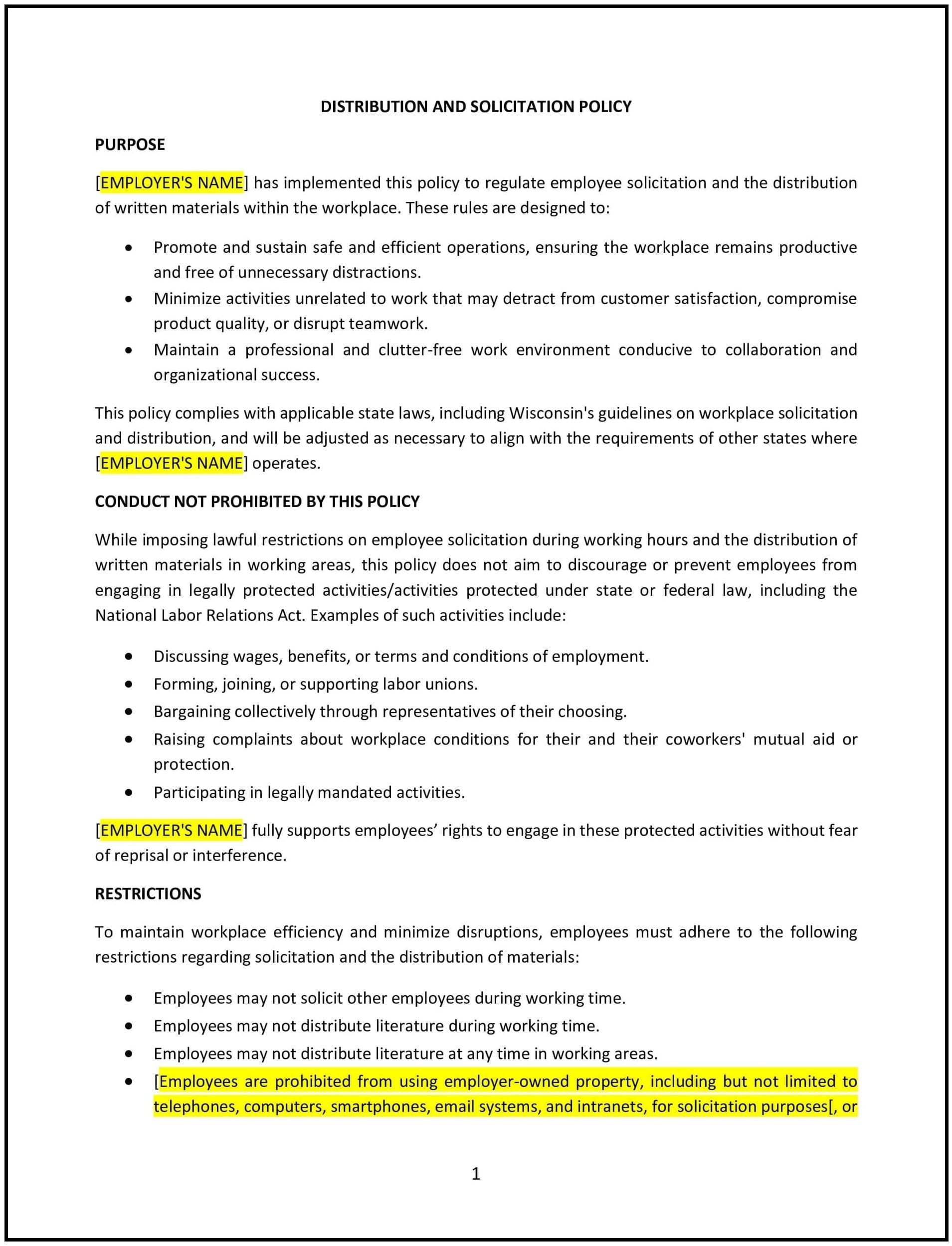Distribution and solicitation policy (Wisconsin): Free template
Got contracts to review? While you're here for policies, let Cobrief make contract review effortless—start your free review now.

Customize this template for free
Distribution and solicitation policy (Wisconsin)
A distribution and solicitation policy helps Wisconsin businesses regulate the distribution of materials and solicitation activities on company premises. This policy outlines guidelines for when, where, and how employees or third parties can distribute materials or engage in solicitation activities, such as advertising, petitioning, or promoting services. It ensures that these activities do not interfere with business operations, employee productivity, or the company’s overall goals.
By implementing this policy, businesses can maintain a balanced, efficient, and respectful workplace while minimizing disruptions and protecting company resources.
How to use this distribution and solicitation policy (Wisconsin)
- Define solicitation and distribution: Clearly define what constitutes solicitation (e.g., asking for donations, promoting services) and distribution (e.g., handing out flyers, leaflets). Specify the scope of activities covered by the policy, including in-person solicitation, the distribution of printed materials, or solicitation via email or digital channels.
- Set designated areas for solicitation and distribution: Specify where on the company premises solicitation and distribution can take place. This could include public spaces such as break rooms or designated areas that do not interfere with employee work areas or productivity.
- Set time restrictions: Determine acceptable times for solicitation and distribution, such as outside of working hours or during designated breaks, to avoid disruption to business operations.
- Restrict third-party solicitation: Establish whether outside parties, such as vendors, charities, or political organizations, are allowed to solicit or distribute materials on company property. If allowed, specify the process for obtaining permission, including any required approvals or limitations on activities.
- Provide approval procedures: Outline the process for obtaining permission to solicit or distribute materials. This may include submitting a formal request to management, HR, or another designated department, and detailing the materials to be distributed or the purpose of the solicitation.
- Address prohibited activities: Specify any activities that are prohibited on company premises, such as solicitation for personal gain, political campaigning, or the distribution of offensive materials. Make it clear that any activities that disrupt the workplace, violate company policies, or cause undue distress will not be tolerated.
- Ensure non-discrimination: The policy should ensure that employees are not discriminated against when engaging in solicitation or distribution activities, as long as these activities are within the policy’s guidelines.
- Enforce consequences: Define the consequences for violating the policy, which may include warnings, removal of materials, or disciplinary action if necessary.
Benefits of using this distribution and solicitation policy (Wisconsin)
This policy offers several benefits for Wisconsin businesses:
- Reduces workplace disruptions: By clearly outlining when and where solicitation and distribution can take place, the policy ensures that these activities do not interfere with employees’ ability to focus and be productive.
- Promotes fairness and consistency: The policy ensures that all employees and third parties are treated fairly and consistently when it comes to distributing materials or soliciting on company premises, reducing potential conflicts.
- Protects company resources: By regulating solicitation and distribution, businesses can prevent unauthorized use of company resources, such as bulletin boards, email systems, or public spaces.
- Maintains professionalism: The policy helps preserve a professional work environment by controlling the type of solicitation and distribution activities that take place and ensuring they align with the company’s values and goals.
- Complies with legal requirements: The policy ensures that the company’s solicitation and distribution activities align with relevant Wisconsin state and federal laws, such as employee rights to organize and engage in collective bargaining, while balancing the company’s business interests.
Tips for using this distribution and solicitation policy (Wisconsin)
- Communicate the policy clearly: Ensure that all employees understand the policy and know where they can distribute materials or solicit, as well as when and how to request approval.
- Be consistent in enforcement: Apply the policy consistently to all employees, contractors, and third parties to avoid confusion and prevent potential discrimination or bias.
- Offer flexibility when appropriate: While regulating solicitation and distribution, consider offering flexibility for causes that align with the company’s values or initiatives, such as charity events or employee-led campaigns.
- Review regularly: Periodically review the policy to ensure it remains effective, adheres to Wisconsin state laws, and aligned with the company’s goals, and make updates as necessary.
- Provide training: Ensure that managers, HR staff, and employees understand how the policy works and how to address any solicitation or distribution issues in the workplace.